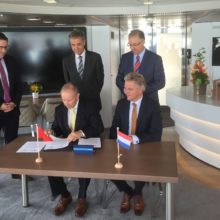The Port of Rotterdam and the Port of Switzerland instigated closer co-operation together with the Basel Region Logistics Cluster in 2012, leading to regular contact at managerial and technical levels. The renewed MoU was signed on 3 September 2016 by Hans-Peter Hadorn, Director of the Port of Switzerland, Emile Hoogsteden, Director Containers, Breakbulk and Logistics at the Port of Rotterdam, and Martin Dätwyler, Director of the Basel Region Logistics Cluster.
The agreement focuses on the expansion of the trimodal infrastructure along Europe’s most important goods traffic corridor, the Rotterdam-Basel-Genoa corridor. With the opening of the new NEAT Gotthard Base Tunnel, both the Port of Rotterdam and the Port of Switzerland are extremely keen to channel goods through this new axis. High-capacity trimodal infrastructure is essential if the ports are to meet their targets for shifting towards inland navigation and rail, and Gateway Basel Nord has a key role to play in this.
Emile Hoogsteden said: “The trimodal Gateway Basel Nord container terminal is a key project along the Rotterdam-Basel-Genoa corridor. The Port of Rotterdam wholeheartedly supports the construction of Gateway Basel Nord, since we depend on high-capacity terminal infrastructure and high efficient cargo handling, particularly in light of the anticipated increase in container traffic. The combination of the Basel hub and the new NEAT Gotthard Base Tunnel will vastly improve goods transport by water and rail and in doing so will open up new perspectives for the Port of Rotterdam too.”
Another focus of the Memorandum of Understanding is the new port community system which has been trialled at RheinPorts Basel-Mulhouse-Weil since earlier this year. Experience gained by the Port of Rotterdam in registering container traffic electronically will be used as input for the inland waterways registration system and is to be extended to include the Upper Rhine ports, with the aim of making container traffic handling even more efficient.
The third focal point of the MoU is the promotion of LNG and GTL. Both ports have been working closely together on an LNG masterplan as part of an EU project for a number of years. The plan is to encourage further use of LNG and GTL both as a fuel and a commodity along the Rhine axis.



